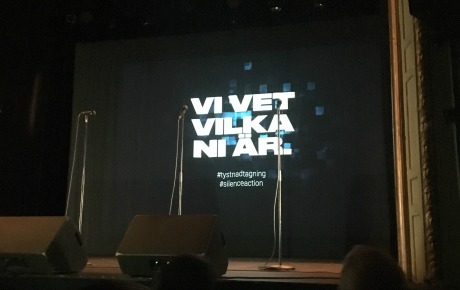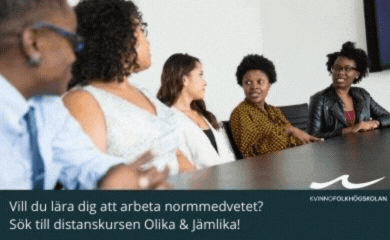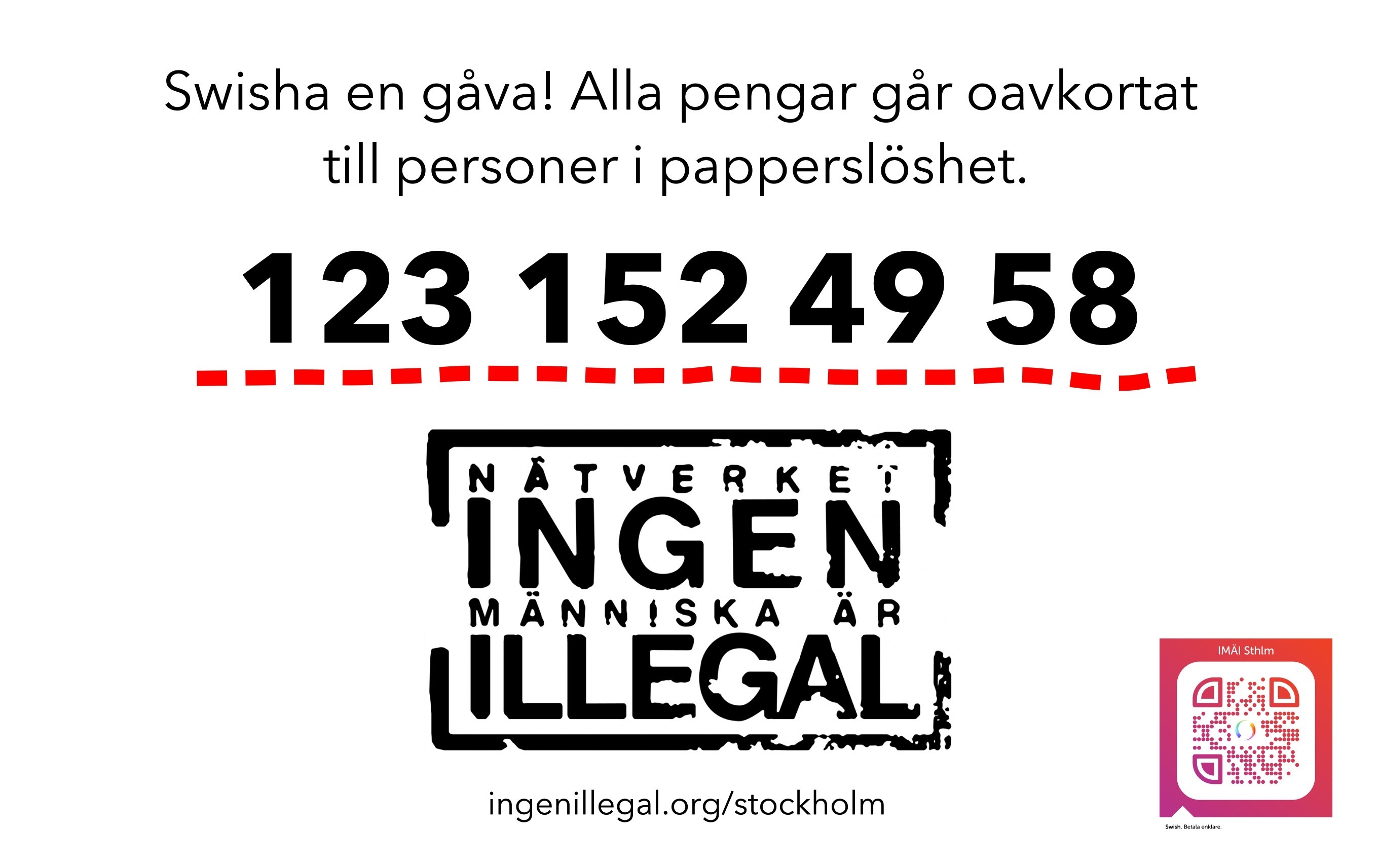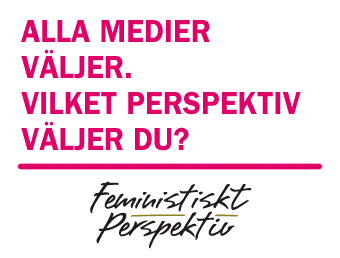
Bild: Anna-Klara Bratt
#metoo: Why massive mobilization swept Sweden
2020-01-10 | Anna-Klara Bratt

INTERNATIONAL
”It is somewhere in the midst of the inflated self-image, the overconfidence and the judicial impotence that Sweden became the country of #metoo-petitions.” Anna-Klara Bratt, editor-in-chief of Swedish weekly, Feministiskt perspektiv, here offers an analysis of as to why the mobilization around #metoo grew so massive in Sweden, pointing to the high employment rate of women as the single largest factor behind the breakthrough.
There is a before and an after #metoo, seen differently throughout the world, but exceedingly sharply, in Sweden. Up to 50 separate appeals, largely organized around working life, have drawn thousands of testimonies and hundreds of thousands of people in different groups online during the autumn 2017. The largest group, #allofus has garnered testimonies from those have been sexually abused outside of the workplace – some 57 000 people. Increasingly we have been able to read about the expleriences of those suffering from domestic abuse as well.
It may be staggering to consider, but there were as many misogynistic experiences prior to #metoo as subsequently. However, we have been witnessing daily acts of detailed testimony taking place in what has become the new worldwide public space of media, insistently and forthrightly. The mirrors of the patriarchs and the narcissists have cracked, an auto-immune disease attacking its own body.
Significantly intelligent, eloquent and massive, the peaceful revolution is powered by international cooperation. Unique; however, it did not spring from nowhere. On the contrary, many have looked to the American movie mogul Harvey Weinstein as the proverbial straw that broke the camel’s back. But for the enormous efforts of the New York Times-journalists Jodi Kantor and Megan Twohey, as well as Ronan Farrow in the New Yorker, these revelations would not have seen the light of day. As it transpired, though, a large number of sexually harassed and sexually abused actresses collectively came forward and testified of their abuse. Some of these victims were very successful actresses, while others’ careers had stalled (often due directly to Weinstein), but all had been dramatically harmed by the abuse.
The world does not want for dominating patriarchs, explosive trigger happy autocrats with invariable aggressive tendencies and little or no impulse control.
With its own global character, the #metoo campaign has been intertwined with great international readiness — especially among women and feminists. And if one takes a moment to pause and reflect one will recollect numerous efforts to talk about sexual abuse, harassment and rape over the years: in literature, movies, music, on stage, in the tabloids, in war reporting, in the classics. In the judicial system, the unions, among the employers, on radio shows, and in women’s shelters—came brave cries for help. And in the academic world, as well. It was only a matter of time, anticipated and eventually enabled by the #metoo organization founded by Tarana Burke in the US more than a decade ago. Thus 2017 was also a year of global manifestations for women’s rights.
With Sweden having one of the highest per capita rate of internet access, collective testimonies in social media have been increasingly prominent—as seen on sites such as the anti racist Rummet [the room] or accounts such as Svart kvinna [Black woman], campaigns like #prataomdet [talk about it] or activist groups such as #jagärhär [I am here], #vistårinteut [we cannot endure it], or most recently #ungisverige [young in Sweden]. All of these venues have had a major impact on the public debate.
Some progress was made during the autumn of 2017. A global awareness raising campaign, a campaign of civil disobedience. The great number of testimonies and the pattern that becomes discernible through them, revealing the often systematic modus operandi of perpetrators, paints a clear picture that cannot be ignore, but it has hardly all been a smooth sailing. For example, consider how the extensive material consisting of internal testimonies on the large tabloid Aftonbladet, Dokument 2.0 was stopped the very day it was supposed to be published. In a press release that day the editors of the material wrote resignedly of their deep sadness at the turn of event: the material would never be published.
Moreover, less glamorous groups have had an even greater challenge in their efforts to influence public opinion: Hotel and restaurant workers, those with experience of substance abuse, people with criminal records or undocumented people have not received as much media attention as those in professions and industries with well known profiles, high salaries, power and influence.
Perhaps not unexpectedly, the ability and willingness to ”tell” has varied greatly from one sector to another. Nevertheless, it is undeniable that #metoo has already had a major impact among all these groups.
The movie mogul Harvey Weinstein may be a man taking liberties in the extreme due to his power, influence and money, but he is far from unique. He has fallen from grace but he does not lack assets and he does not fall alone. During the autumn of 2017 golden parachutes were plentiful. In some cases third parties such as families, colleagues, corporate groups, institutions and political parties have also been affected. Note, however, the harm had already been done, long before #metoo exploded in appeals across numerous sectors.
While the investigative reporting on the abuse of Weinstein in the US set things in motion there, the reporting on the systematic abuse, and even rape, by a man with close ties to the Swedish Academy had something of a similar effect on #metoo in Sweden. The revelation on November 22 2017 by Dagens Nyheter’s reporter Matilda Gustavsson included interviews with 18 women who told o f sexual assaults and harassment, some events dating back as far as the 1990’s. The perpetrator, an artistic director, was sentenced to two and half years in prison last year. Another significant contribution to #metoo in Sweden was made by Svenska Dagbladet, who published the first branch specific petition #action on November 19 2017.
Some employers may have used the #metoo to get rid of male ballast. Other employers, or indeed trade unions, may have wanted give off an air of ’taking strong action’ to remedy an earlier behaviour of failing to act on information of abuse and harassment. Yet the most important aspect of #metoo was not been the individual cases, but the obvious structural character of the abuse, how methodically abusers act and the high price paid by many because of it.
Hundereds of thousands of women and non-binary people are no longer alone, although some still are. For whoever choose to listen there are other serious hierarchies that demand a high economic, as well as social, price. The time of the petitions is not over.
Groups who have organized around violence in working life, and/or at home, have enjoyed solidarity, but sometimes our networks have been closed and only a fraction of testimonies have reached the broader public. Chilling testimonies of incest, paedophilia, daily abuse and systematic discrimination – yet the testimonies have been characterized by relief and determination. Now, the headlight light has been redirected – towards the perpetrator. Many have worked for this change in perspective for a long time, through projects and political ideas. Now it has happened.
As a consequence the self-image of Sweden collapsed. Not altogether but it poked a hole in the illusion of Sweden as a paradise of equality. It is in the midst of that inflated self-image the overconfidence and the judicial impotence that Sweden became the country of #metoo-appeals.
There have been plenty of signs. The discrepancy between the number of reported rapes and the number of convictions; the international comparisons; and on the other hand a successful campaign for the necessity for unambiguous consent which was made into law in 2018. Sweden was among the three countries with the highest proportion of women exposed to violence, according to the most comprehensive EU-wide survey in 2014. The statistical, randomized study, which was based on deep interviews from each country has been puzzling, but can not be ignored. Only the Netherlands and Denmark had worse results than Sweden.
But in Denmark and the Netherlands, #metoo has not had the same impact as in Sweden. One thing missing in these countries is the haughty self-image. And in Sweden there is also the existence of a rather well organized women’s and feminist movement. A plethora of modes of organizing, feminist parties, newspapers, social forums, NGO:s, interest groups, women’s shelters, committees and and women-dominated trade unions.
The single most distinctive character of Sweden from a ”historical” perspective is still the high rate of employment of women. And possibly, as a consequence of this the high rate of single households, yes, the opportunity of self sufficiency. Women’s entry into and high participation in the labour market meant some of the unpaid work shifted to, albeit low, paid labour, childcare and eldercare. These developments as well as unionizing is why #metoo grew so massive in Sweden.
That trade unions and employers have failed greatly in dealing with the issues brought to the fore by #metoo is something to think about. Sweden does not lack legislation against sexual harassment och discrimination, in the workplace or at home. It is the compliance with such legislation that is so blatantly absent.
In that EU study on violence against women the three worst countries has something in common, namely a profuse and aged alcoholic culture. Not seldom is that culture connected to work. Thus the 1922 prohibition on alcohol is the only bill that a majority of Swedish women have voted for in national referendum since the early 20th century.
Patriarchs may have fallen in the autumn of 2017, but patriarchy is stronger than ever Susan Faludi warns in the New York Times. We know, one would like to respond. No one thinks that #metoo will ”last” forever but many of us have been both elated and surprised about the extent, stamina and impact that #metoo has had in Sweden. A minor revolution, no doubt. That everyone involved have broken the prevailing culture of silence gives hope for the future. Trade unions, employers as well as the vulnerable will think twice before burying or erasing testimony in the future. But we also know the cases coming before the courts will still encounter stiff opposition.
As everyone is wondering what’s going to happen - in Sweden, a reasonable effect should be a legal system that will actually function properly. Thus one of the most subversive appeals was that of women within the judicial system. The level of mobilization for that appeal was closer to 40 percent of the entire legal chorp. That is to say close to every woman active in the legal sector participated in the closed forums. This again underlines the importance of a high rate of employment among women.
And if anyone asks what action is needed, there are plenty of proposals in the some 50 appeals. Do not wave them away – most of them are now published in this newspaper, Feministiskt perspektiv.
Kommentarer
Du måste vara inloggad för att kunna lämna en kommentar.
























MEST KOMMENTERAT
SENASTE KOMMENTARERNA
Om Var Grupp 8 en feministisk organisation?
Om #bildskolan 21: Att äta Den Andre
Om #bildskolan 21: Att äta Den Andre
Om Porr handlar om betalda övergrepp
Om Nobels fredspris till kampanj för att avskaffa kärnvapen
Om Feministiskt perspektiv öppnar arkivet och startar på nytt!
Om Rödgrönt ointresse för fred och nedrustning borde oroa många
Om Var inte målet att vi skulle jobba mindre?
Om Feministiskt perspektiv öppnar arkivet och startar på nytt!
Om Feministiskt perspektiv öppnar arkivet och startar på nytt!
MEST LÄST